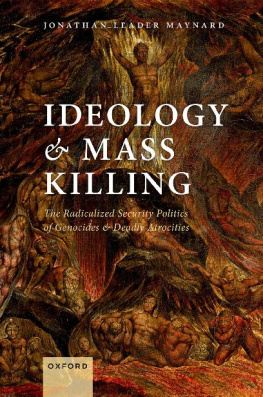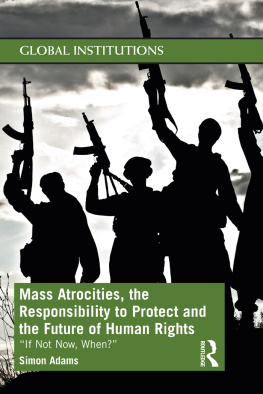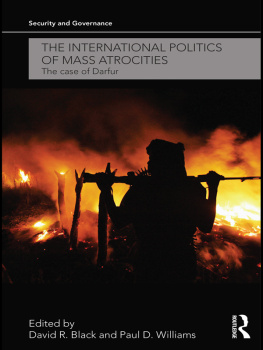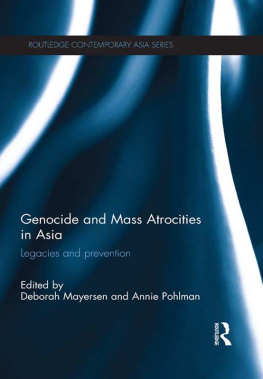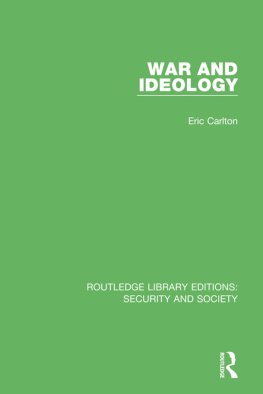Ideology and Mass Killing
Ideology and Mass Killing
The Radicalized Security Politics of Genocides and Deadly Atrocities
JONATHAN LEADER MAYNARD
Great Clarendon Street, Oxford, OX2 6DP,
United Kingdom
Oxford University Press is a department of the University of Oxford. It furthers the Universitys objective of excellence in research, scholarship, and education by publishing worldwide. Oxford is a registered trade mark of Oxford University Press in the UK and in certain other countries
Jonathan Leader Maynard 2022
The moral rights of the author have been asserted
Impression: 1
All rights reserved. No part of this publication may be reproduced, stored in a retrieval system, or transmitted, in any form or by any means, without the prior permission in writing of Oxford University Press, or as expressly permitted by law, by licence or under terms agreed with the appropriate reprographics rights organization. Enquiries concerning reproduction outside the scope of the above should be sent to the Rights Department, Oxford University Press, at the address above
You must not circulate this work in any other form
and you must impose this same condition on any acquirer
Published in the United States of America by Oxford University Press
198 Madison Avenue, New York, NY 10016, United States of America
British Library Cataloguing in Publication Data
Data available
Library of Congress Control Number: 2021952418
ISBN 9780198776796
DOI: 10.1093/oso/9780198776796.001.0001
Printed and bound by
CPI Group (UK) Ltd, Croydon, CR0 4YY
Links to third party websites are provided by Oxford in good faith and for information only. Oxford disclaims any responsibility for the materials contained in any third party website referenced in this work.
Acknowledgements
This book would not exist, let alone have taken anything like its eventual form, were it not for the support and assistance of dozens of friends and colleagues. In the first years of working on this project, two of the leading figures in the Department of Politics and International Relations at the University of Oxford inspired and guided my research. The first was Elizabeth Frazer, who served as both my masters and doctoral supervisor. Its very hard to put into words the depth and breadth of both Lizs intellect and her contribution to my life as an academic. She has exerted a major influence over my understandings of politics, violence, and ideology, and offered me great feedback on several sections of the book. But more than that, being supervised by Liz hugely improved my ability to think and the care and depth with which I thought about theory, argument, and method as a politics researcher. Like so many at the University of Oxford, I cannot adequately repay her. Second, I owe a huge debt to Jennifer Welsh, who as Professor of International Relations at Oxford initiated my scholarly engagement with international relations research on atrocities, norms, and ideas. In her subsequent roles as United Nations Special Advisor for the Responsibility to Protect, Professor of International Relations at the European University Institute, and Chair in Global Governance and Security at McGill University, Jennifer offered me much feedback and encouraged me to develop the normative and preventive implications of my research. My work owes a huge debt to her insight, advice, and scholarship, and I feel immensely privileged to know her.
Beyond Liz and Jennifer, I owe so much to Thomas (Tad) Homer-Dixon, who has been a source of inspiration, advice, and intellectual engagement since I first met him in Oxford in April 2012. Tad took a major leap of faith in inviting me to join a network of researchers interested in ideology based at the University of Waterloo, Ontario, and he and that network have tremendously enriched my thinking. Beyond that, Tad has become a great friend, and was immensely generous in reading half the book manuscript and giving me invaluable feedback. I cannot thank him enough. I extend that thanks, moreover, to all those scholars Tad brought together to create such exciting conversations as part of the Ideological Conflict Project at the University of Waterloo, in particular Marisa Beck, Esra udahar, Scott Janzwood, David Last, Matto Mildenberger, Manjana Milkoreit, Steven Mock, Jinelle Piereder, Steve Quilley, Tobias Schrder, and Paul Thagard. My appreciation also goes to the Balsillie School of International Affairs and the Waterloo Institute for Complexity and Innovation for hosting and supporting our discussions.
Many scholars at the University of Oxford have offered sustained input and encouragement for my research. I am profoundly indebted to Michael Freedenboth for offering me so much advice and support over the years, and more obviously for his preeminent scholarship on ideology, which transformed my understanding of the topic. Im similarly grateful to Martin Ceadel, who gave me great support in my first years at New College, Oxford; to Andrea Ruggeri, with whom I had much intellectual engagement surrounding our overlapping research agendas on ideology and armed conflict; and to Stathis Kalyvas, who gave me much encouragement for the research project and tremendously invigorated the conflict studies community at Oxford. I have also gained a lot from broader engagement with Janina Dill, Todd Hall, Dominic Johnson, Juan Masullo, and Matt Zelina, and owe thanks to the organizers and members of the Global Ideas workshop at Oxford: David Priestland, Faridah Zaman, Paul Betts, Dace Dzenovska, Faisal Devji, and Yaacov Yadgar. I owe both professional and intellectual debts to Hugo Slim and Martin Shaw, who acted as my examiners for my doctorate and gave me much input and encouragement for the whole project. The influence of their work is frequently visible in the pages that follow. The first stage of research for this book was conducted during my doctorate at Oxford funded by a research grant from the Arts and Humanities Research Council, and extended into a Junior Research Fellowship at New College, and a Departmental Lectureship at Oxfords Department of Politics and International Relations. All three institutions also have my deep gratitude. Im incredibly appreciative to Oxford University Press and my editor Dominic Byatt for publishing the book, and for showing immense patience when I decided to heavily rework some of the research between 2019 and 2021. My thanks also go to three anonymous referees, who offered supportive and detailed feedback on the original book proposal.
Beyond Oxford, numerous leading scholars have been incredibly generous in giving various forms of support to my work. My own understanding of mass killing, and the role of ideology in it, is tremendously influenced by the pioneering work of Scott Straus, who has given me invaluable advice and feedback on the project and the draft manuscript. I am also grateful to the support of Lee Ann Fujii, whose work reshaped my thinking about political violence, who offered me encouragement and input into my work in the short time I knew her, and whose unexpected death in March 2018 devastated me, as it did the discipline of political science. I am profoundly indebted to both the research and assistance of a broader group of scholarsmany of whom have become great friendswho offered feedback on chapters of the manuscript or in other ways gave key input and support to my research. I therefore offer huge thanks to Gary Ackerman, Alex Bellamy, Susan Benesch, Donald Bloxham, Rachel Brown, Zeynep Bulutgil, Sabina ehaji-Clancy, Coline Covington, Alan Cromartie, Lesley-Ann Daniels, Lorne Dawson, Mark Drumbl, Jonathan Glover, Barbora Hola, Erin Jessee, Sinia Maleevi, Dominik Markl, Omar McDoom, Theo McLauchlin, Elisabeth Hope Murray, Hollie Nyseth Brehm, Emily Paddon, Vladimir Petrovic, Juliane Prade-Weiss, Scott Sagan, Lee Seymour, David Simon, Savina Sirik, Timea Spitka, Abbey Steele, Sidney Tarrow, Kai Thaler, Benjamin Valentino, Manuel Vogt, Sri Wahyuningroem, and Elisabeth Jean Wood. My thanks also to the numerous members of the International Association of Genocide Scholars, International Network of Genocide Scholars, Conflict Research Society, International Studies Association, and American Political Science Association, as well as attendees at a wide range of other workshops, for their comments on presentations of my work. Thanks also to Sadia Fatima Hameed and all members of the Dangerous Speech Network convened by Wellspring Advisors for providing an invaluable forum for discussing the dynamics of extreme violence and atrocity prevention.



